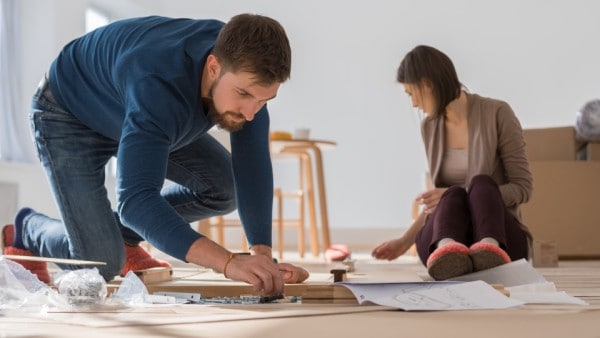Your new home is a big thing, a big investment, a big responsibility. And a big reward. Understanding the processes, and being organised, is important and will help make your new home build a better process.
Building your own new home gives you the freedom to enjoy a new property that has been built especially for you. But keep in mind that this big project requires close attention, careful consideration and steady management.
Ok, let’s run through the key steps of the new home building process.
You’re excited. We know, and that’s good. What’s even better is to use your excitement and energy, and pour it into being well organised. If you can combine, energy, inspiration and organisation into your new home, you’ll be winning.
- newhomesguide.com.au
Dream. Big.
Right at the start is the time to dream big. It might not be what you end up with, and that’s ok. The important thing is that you let yourself consider some concepts and do some free thinking.
Dream big, do some research, discuss with your husband / wife / partner / kids / parents. Review, refine, reflect. This is your starting point so explore now, and be ready to take a reality check soon, look at budgets and create the picture of what will be your final new home.
Choose a home design
This is about you and your family. So ask yourself now - Where do you want to build? What do you want to build? What can you afford?
We’re all so spoiled for choice in terms of building a new home. There’s house and land packages, project homes, custom homes and DIY kit homes. Every option has it’s own benefits, and some have more compromises than others. Ultimately, your budget will be a big part of your final decision, so get this clearly defined before you start looking at designs.
Find the land
You’ll need something to put your new home on. If you’re not rebuilding on an existing block, make sure your new home design works with the land you want to buy. Matching the new home to the block of land can impact on the cost of the build, so get an expert to inspect your site before making final decisions on buying the land or the home design.
Choose a builder
Spend time finding the right builder for your project, it’s well worth it. Ask friends, call the HIA and invite builders to submit proposals and quotes on your new home. Good builders will provide detailed plans including accurate costs.
When you have found the builder you like, and can work with for a year or so, make sure their contract covers everything and agree to a firm timeline. Don’t muck around at this stage - Have the contract, plans, agreement and insurances checked by a lawyer before you sign on the dotted line.
Apply for a home loan
You won’t be building much if you don’t have your finances well organised. Stay in control of the money, work out your budget, what you can borrow and the projected costs as early as you can.
Be sure to understand the deposit to be paid, and the schedule of progress payments. Again, a lawyer or conveyancer should be able to help advise you in these areas. And before you apply for your home loan, make sure you have accounted for additional costs like stamp duty and legal fees.
Sign the contract
When the costs have been agreed with your new home builder. Carefully review the contract with your legal eagle. People often get into trouble because of errors in the contract, or simply because they haven’t taken the time to understand it properly before signing. Get a clear understanding and then you can sign with confidence.
It’s important to make sure that your new home contract is in line with the local laws and council requirements in the area you will be building. Your builder should be responsible for taking care of building licences and permits from the relevant authorities.
Monitor the build
It’s very important that you’re involved in every stage of the building process. The first step is usually a pre-start meeting with your builder to choose what will be the final finishes and fittings.
It’s a good idea to keep notes of the important discussion points and details when you meet with the builder. Take notes stay on top of progress updates, letters and notices and site photos and things progress. If this seems like too much, and your budget allows, you could hire an independent building consultant to monitor the construction on your behalf.
Complete the handover
About one week after practical completion on your home, you’ll be able to collect the keys, make final payments and move on in. At this stage you should get copies of warranties and certificates as detailed in your contract. And make sure you receive a written authority from the builder that your new home is completed and safe to live in.



